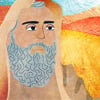The chassid Rabbi Shmuel Munkes was traveling to spend Rosh Hashanah with his Rebbe, Rabbi Schneur Zalman of Liadi, when he was stranded in a small shtetl over Shabbat.
Soon after Shabbat was over, the village retired to an early bed. Several minutes before midnight, the shamash began making his rounds with a lantern in one hand and a wooden mallet in the other, pounding on the shutters of each home and calling, "Wake up! Wake up! Wake up to the service of the Creator!" The entire village climbed out of bed, dressed swiftly, and hurried to the brightly lit synagogue for Selichot, the solemn prayer that opens the High Holiday season.
In the home of Rabbi Shmuel's host there was much confusion. The entire family had dressed and gathered at the door, prayerbooks in hand, ready to depart for the synagogue; but their prestigious guest had yet to emerge from his room. Finally, the villager knocked softly on Rabbi Shmuel's door. No response. Slowly he entered the room. To his amazement, he found the chassid sound asleep.
"Reb Shmuel, Reb Shmuel," he urged, shaking his guest awake. "Come quickly. Selichot."
Rabbi Shmuel's only response was to burrow even more deeply under the covers.
"Hurry, Reb Shmuel," his host persisted. "They're about to begin in the synagogue any moment now."
"Begin what?" asked Rabbi Shmuel, quite obviously annoyed. "It's the middle of the night. Why are you waking me in the middle of the night?"
"What's the matter with you?" cried the villager. "Tonight is Selichot! A fine Jew you are! Why, if I hadn't woken you, you would have slept through the entire Selichot!"
"Selichot?" asked Rabbi Shmuel. "What is Selichot?"
Rabbi Shmuel's host was beside himself with incredulity. "Are you making a mockery of me? Don't you know that today was the Shabbat before Rosh Hashanah? Every man, woman and child of the village is now in the synagogue, trembling with trepidation. Soon the baal tefillah will begin chanting the Selichot prayers and the entire community will burst into tears, praying and begging G‑d to bless them with a good year..."
"So that's what this commotion is all about?" asked Rabbi Shmuel. "You're going to the synagogue to pray? What's so urgent that can't keep until morning? What are you praying for?"
"There's so much to pray for, Reb Shmuel," sighed the villager. "I pray that the cow should give enough milk to keep my children healthy. I pray that the oats should fetch a good price on the market this year, for soon I shall have a daughter to marry off. I pray that my horse should not break a leg, G‑d forbid, as happened the year before last..."
"I don't understand," interrupted Rabbi Shmuel. "Since when do grown men wake up in the middle of the night to ask for a bit of milk?"
The Villager Was Right
Rabbi Shmuel Munkes wished to impress upon his host that there is more to preparing for Rosh Hashanah than praying to G‑d for one's material needs. Rosh Hashanah is the day on which we proclaim G‑d king of the universe and commit ourselves to obey and serve Him. It is a time for teshuvah, for repenting for one's sins and failings and resolving never to repeat them. Is this the time to approach G‑d with a "shopping list" of our material needs?
And yet, a glance at the Rosh Hashanah prayerbook shows that it abounds with requests for life, health and sustenance. For on Rosh Hashanah, the Divine energy that vitalizes all of creation is "renewed" for another year, and every creature is allotted its share of life, happiness and wealth. The simple villager was right: Rosh Hashanah is the time to pray that the cow should give milk and the oats should fetch a good price in the marketplace.
How, indeed, are we to reconcile the loftiness of the day with the mundane subject of a significant part of its prayers?
But the very concept of prayer carries the same paradox. Prayer is the soul's communion with its Creator, its island of heaven in an otherwise earth-bound day. Indeed, the Hebrew word for "prayer," tefillah, means "attachment," it being the endeavor to rise above our pedestrian concerns and connect to our Divine source. Yet the essence of prayer, the foundation upon which its spiritual edifice rests, is our beseeching the Almighty to provide us with our everyday needs.
The paradox of prayer is magnified a thousand fold when it comes to the prayers of Rosh Hashanah. On Rosh Hashanah, we are not only standing before G‑d; we are crowning Him king, pledging to Him the total abnegation of our own self, and all its desires, to His will. What place is there on this day for the very notion of personal need?
A Dwelling Below
As discussed at length in our previous Rosh Hashanah essays, only man can make G‑d king, for only man possesses the capacity for free choice—without which the very concept of "kingship" is devoid of significance. By freely submitting to the Divine sovereignty on Rosh HaShanah, we reawaken His desire to be king and infuse a new vitality into His involvement with the whole of creation.
The Divine desire to be king is also described by our sages as a desire for "a dwelling in the lower realms"--a home in the physical world. Why the physical world? Because only in the physical arena does true choice exist. The world of spirit is naturally inclined toward its Divine source. Thus, our service of G‑d in the spiritual areas of our lives is a "compelled" service, driven by the natural inclinations of our spiritual selves. On the other hand, when we invite G‑d into our physical lives, when we serve Him through physical deeds and with the materials of our physical existence, we are truly choosing to submit to Him, for such servitude goes against the very grain of our physical nature.
Thus, one who considers it "unbecoming" to entreat G‑d for milk for his children on Rosh Hashanah rejects a most fundamental aspect of the Divine sovereignty. Crowning G‑d king means accepting Him as sovereign in all areas of our lives, including — and primarily — our most mundane needs and requirements. It means acknowledging our utter dependence upon Him not only for our spiritual nurture, but for the piece of bread that sustains our physical existence.
Seen in such a light, our needs are not personal needs, and our requirements are not selfish requirements. Yes, we are requesting food, health and wealth; but we are requesting them as a subject requests them from his king — as a servant asking his master for the means with which to better serve him. We ask for money to observe the mitzvah of charity; for strength to build a Sukkah; for food to keep body and soul together so that our physical lives may serve as a "dwelling in the lower realms" that houses His presence in our world.
Chanah's Prayer
The haftarah (reading from the Prophets) for the first day of Rosh Hashanah tells the story of Chanah, the mother of the prophet Samuel:
Chanah, the childless wife of Elkanah, came to Shiloh (where the Sanctuary stood before King Solomon built the Holy Temple in Jerusalem) to pray for a child.
She prayed to G‑d, weeping profusely. And she vowed a vow, and said: "O L-rd of hosts... If You will give Your maidservant a man child, I shall dedicate him to G‑d all the days of his life..."
Eli, the High Priest at Shiloh, watched as she
prayed profusely before G‑d... Only her lips moved; her voice was not heard.
Eli thought her a drunkard. And he said to her: "How long shall you be drunken! Put away your wine!" Chanah replied: "No, my lord... I have drunk neither wine nor strong drink. I have poured out my soul before the face of G‑d..."
Eli blessed her that G‑d should grant her request. That year, Chanah gave birth to a son, whom she named Samuel ("asked from G‑d"). After weaning him, she fulfilled her vow to dedicate him to the service of G‑d by bringing him to Shiloh, where he was raised by Eli and the priests. Samuel grew up to become one of the greatest prophets of Israel.
The "Prayer of Chanah," as this reading is called, is one of the fundamental biblical sources for the concept of prayer, and many of the laws of prayer are derived from it. Indeed, the dialogue between Eli and Chanah touches on the very essence of prayer, and of prayer on Rosh Hashanah in particular.
Eli's accusation of "drunkenness" can also be understood as a critique of what he saw as an excessive indulgence in the wants and desires of the material self on Chanah's part. You are standing in the most holy place on earth, Eli was implying, in the place where the Divine presence has chosen to dwell. Is this the place to ask for your personal needs? And if you must ask for them, is this the place to "pray profusely," with such tenacity and passion?
You misunderstand me, answered Chanah. "I have poured out my soul before the face of G‑d." I am not merely asking for a son; I am asking for a son that I might "dedicate him to G‑d all the days of his life."
Our sages tell us that Samuel was conceived on Rosh Hashanah. G‑d's fulfillment of Chanah's prayer on this day encourages us to indeed avail ourselves of the awesome moment of G‑d's coronation to approach Him with requests for our everyday needs. For on this day, our "personal" needs and our desire to serve our Master are one and the same.







Join the Discussion